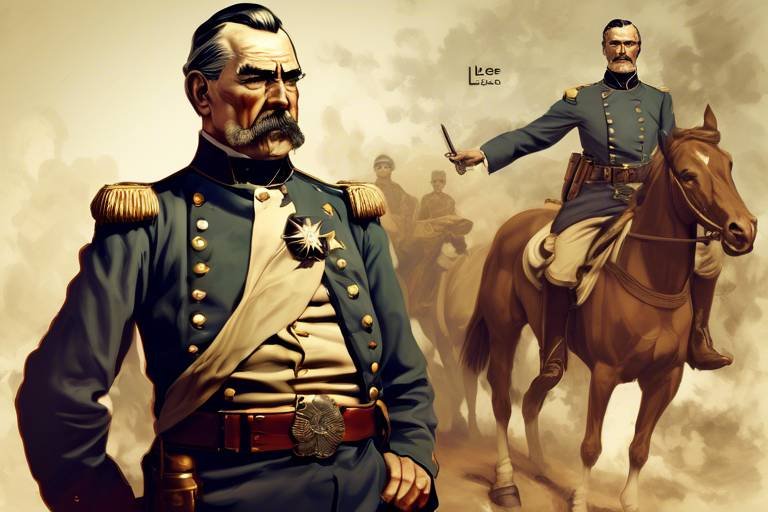Lee: The General Who Defended the South
Robert E. Lee, a distinguished military leader, is renowned for his pivotal role in defending the Southern states during the American Civil War. His strategic brilliance and unwavering commitment to the Confederate cause solidified his reputation as a formidable general who fought fiercely to protect the interests of the South.

Early Life and Military Career
Robert E. Lee, a prominent figure in American history, was known for his remarkable leadership during the Civil War. Let's delve into the life and military career of this iconic general who played a crucial role in defending the South.
Robert E. Lee was born on January 19, 1807, in Westmoreland County, Virginia, into a prestigious and influential family. Growing up, he received a quality education and showed early signs of military prowess. Graduating from the United States Military Academy at West Point in 1829, Lee embarked on a distinguished military career in the U.S. Army.
Throughout his military service, Lee demonstrated exceptional leadership skills and strategic thinking, quickly rising through the ranks. His experience in various military campaigns and assignments honed his abilities, earning him a reputation as a talented and respected officer.
By the time the Civil War erupted in 1861, Lee had achieved the rank of Colonel in the U.S. Army and had gained significant experience in combat and military strategy. His background and expertise positioned him as a formidable commander with the potential to leave a lasting impact on the course of the war.
Lee's dedication to duty and his commitment to his principles ultimately led him to make a fateful decision that would alter the course of his career and the nation's history.

Decision to Fight for the Confederacy
Robert E. Lee's decision to fight for the Confederacy was a pivotal moment in his life and in the history of the United States. Despite his deep-rooted loyalty to the Union and his reluctance to see his country torn apart, Lee ultimately chose to resign from the U.S. Army and take up arms for the Confederate cause. This decision was not made lightly, as Lee grappled with conflicting loyalties and a sense of duty to his home state of Virginia.
One of the key factors that influenced Lee's decision was his belief in states' rights and the principle of local governance. As a Virginian, Lee felt a strong connection to his state and its people, viewing their interests as paramount. When Virginia seceded from the Union in 1861, Lee faced a difficult choice between his allegiance to the federal government and his allegiance to his home state.
Additionally, Lee's personal relationships and sense of honor played a significant role in his decision to fight for the Confederacy. Many of Lee's friends and colleagues sided with the South, including his mentor, General Winfield Scott. Feeling a sense of duty to his comrades and a desire to defend his homeland, Lee chose to cast his lot with the Confederacy.
Furthermore, Lee's opposition to the institution of slavery, despite his own family's slaveholding history, complicated his decision. While Lee personally disliked slavery and viewed it as a moral evil, he also believed in the right of individual states to govern themselves. This internal conflict between his moral principles and his political beliefs added another layer of complexity to Lee's choice to fight for the Confederacy.
In the end, Robert E. Lee's decision to join the Confederate cause was a turning point in his life and in the course of the Civil War. His leadership and military prowess would come to define the Confederate army and shape the outcome of the conflict. Despite the controversies and debates that surround his legacy, Lee's decision to fight for the Confederacy remains a significant chapter in American history.

Battles and Strategies
Robert E. Lee, a remarkable figure in American history, was not just a general but a symbol of honor and duty. His legacy is deeply intertwined with the tumultuous era of the Civil War, where his strategic brilliance and unwavering leadership played a pivotal role in shaping the course of history.
Lee's military prowess was showcased in a series of pivotal battles that defined the Civil War. One of his most famous victories was the Battle of Chancellorsville, where his audacious tactics and bold maneuvers outmaneuvered the Union forces despite being outnumbered. The use of flanking movements and swift decision-making became hallmarks of Lee's strategies, earning him a reputation as a master tactician on the battlefield.
Another significant engagement was the Battle of Gettysburg, a turning point in the war that tested Lee's strategic acumen. Despite his tactical brilliance, Lee's aggressive assault on Union forces led to heavy casualties and a costly defeat. This marked a shift in the momentum of the war and highlighted the challenges faced by the Confederate army under Lee's command.
Throughout the war, Lee's ability to adapt to changing circumstances and innovate his military tactics kept the Confederate forces competitive against the Union army. His emphasis on mobility, surprise attacks, and exploiting enemy weaknesses demonstrated a keen understanding of warfare that influenced future generations of military leaders.
Lee's strategies were not just about winning battles but about achieving long-term objectives that would secure the Confederacy's survival. His vision extended beyond the immediate conflict, encompassing the broader implications of each military decision on the war's outcome.

Relationship with Stonewall Jackson
Robert E. Lee's relationship with Stonewall Jackson was a legendary partnership that played a crucial role in the Confederate military strategy during the Civil War. Known for their mutual respect, trust, and complementary skills, Lee and Jackson formed a bond that was admired by their troops and feared by their enemies.
The two generals shared a deep understanding of each other's tactics and battlefield instincts, often communicating through unspoken gestures and nods. Jackson's aggressive and daring approach to warfare complemented Lee's strategic vision and calm demeanor, creating a formidable team that achieved remarkable success on the battlefield.
One of the most famous examples of their collaboration was during the Battle of Chancellorsville, where Jackson executed a daring flanking maneuver that surprised and overwhelmed the Union army. Lee's trust in Jackson's unconventional tactics and Jackson's unwavering loyalty to Lee solidified their bond as one of the most effective military partnerships in history.
Despite Jackson's untimely death at the height of his military success, his legacy lived on in Lee's memory and strategic decisions. Lee deeply mourned the loss of his dear friend and valued advisor, recognizing the irreplaceable void left by Jackson's absence on the battlefield.
Throughout their partnership, Lee and Jackson exemplified the essence of teamwork, mutual respect, and unwavering dedication to their cause. Their relationship symbolized the strength and camaraderie that defined the Confederate leadership during one of the most tumultuous periods in American history.

Challenges and Setbacks
Robert E. Lee, despite his remarkable military prowess, faced numerous challenges and setbacks during his command of the Confederate forces. One of the most significant challenges he encountered was the constant shortage of resources, including food, ammunition, and medical supplies. The Confederate army was often ill-equipped and undernourished, putting additional strain on Lee's strategic decisions and battlefield performance.
Moreover, Lee had to contend with the Union's superior numbers and industrial capabilities. The North's larger population and vast resources posed a formidable obstacle for the Confederacy. Despite Lee's tactical brilliance, he was often outnumbered and outgunned, leading to difficult battles and strategic retreats.
Another major setback for Lee was the internal divisions within the Confederate leadership. Conflicting opinions and personal rivalries among Confederate generals sometimes hindered effective coordination and communication. This lack of unity at the top echelons of command occasionally undermined Lee's efforts to execute cohesive military strategies.
Furthermore, the geographical challenges of the Southern terrain presented obstacles for Lee's army. The rugged landscapes, harsh weather conditions, and limited infrastructure in the South made transportation and supply lines vulnerable to Union attacks. Lee had to navigate these challenging environments while facing off against the Union forces, adding another layer of complexity to his military campaigns.
Despite these formidable challenges and setbacks, Robert E. Lee displayed resilience and determination in leading the Confederate army. His ability to adapt to adversity, inspire his troops, and make strategic decisions under pressure solidified his reputation as a legendary military commander, even in the face of overwhelming odds.

Legacy and Controversies
Robert E. Lee left behind a complex legacy that continues to spark debates and controversies. On one hand, he is revered by many as a brilliant military tactician and a symbol of the Confederacy's fight for states' rights. His strategic prowess on the battlefield and his unwavering dedication to his cause have earned him a place in history as one of the most respected generals of the Civil War era.
However, Lee's legacy is also marred by his association with the institution of slavery and the Confederacy's defense of it. As the commander of the Confederate army, Lee fought to preserve a way of life that relied on the labor of enslaved people. This aspect of his legacy has led to heated debates about his character and intentions, with some viewing him as a noble defender of his homeland and others as a symbol of oppression and racism.
One of the most controversial aspects of Lee's legacy is his post-war image and the ways in which he has been remembered in the years since the Civil War. Monuments and memorials dedicated to Lee have been the subject of intense scrutiny and debate, with many arguing that they glorify a figure associated with a dark chapter in American history. The ongoing discussions about the removal or preservation of these monuments highlight the deep divisions in society over how to remember and honor figures like Lee.
Despite the controversies surrounding his legacy, Robert E. Lee remains a figure of historical significance whose impact on the Civil War and American history cannot be ignored. His leadership, military strategies, and personal beliefs continue to be studied and debated by historians, scholars, and the general public, shaping our understanding of the complexities of the past and the legacies of those who played pivotal roles in shaping it.

Impact on Civil War History
Robert E. Lee's impact on Civil War history is profound and far-reaching. His strategic brilliance and unwavering determination played a pivotal role in shaping the outcome of the conflict. Lee's military prowess and leadership skills were instrumental in sustaining the Confederate cause against the Union forces.
One of the most significant impacts of Lee's leadership was his ability to inspire his troops and instill a sense of loyalty and dedication among them. His charismatic presence on the battlefield motivated soldiers to fight with unparalleled courage and conviction, even in the face of overwhelming odds.
Lee's tactical decisions during key battles such as the Battle of Chancellorsville and the Battle of Gettysburg showcased his strategic acumen and innovative approach to warfare. His daring maneuvers and bold strategies often caught the Union forces off guard, leading to decisive victories for the Confederacy.
Furthermore, Lee's reputation as a military genius and his ability to outmaneuver and outwit his opponents earned him the respect and admiration of both his allies and adversaries. His legacy as a formidable commander continues to be studied and revered by military historians and strategists to this day.
Moreover, Lee's surrender at Appomattox Court House in 1865 marked the end of the Civil War and paved the way for the reunification of the United States. Despite the Confederacy's defeat, Lee's honorable conduct in defeat and his efforts to promote reconciliation between the North and the South contributed to the healing process after the war.
In conclusion, Robert E. Lee's impact on Civil War history cannot be overstated. His leadership, strategic vision, and legacy as a military commander have left an indelible mark on the course of American history and continue to be studied and debated by scholars and enthusiasts alike.

Lee's Views on Slavery and Reconstruction
Robert E. Lee, a prominent figure in American history, was known for his remarkable leadership during the Civil War. Let's delve into his early life, military career, decision to fight for the Confederacy, battles and strategies, relationship with Stonewall Jackson, challenges faced, legacy, controversies, impact on Civil War history, and his views on slavery and reconstruction.
Robert E. Lee's views on slavery and reconstruction were complex and evolved over time. Despite coming from a slaveholding family, Lee expressed conflicting opinions on the institution of slavery. While he believed that slavery was a moral and political evil, he also upheld the institution as a way of life in the South, viewing it as essential to the economy and social structure.
Lee's stance on reconstruction post-Civil War reflected his desire for reconciliation and unity. He advocated for the peaceful reintegration of the Southern states into the Union, emphasizing the need for healing and moving forward as a nation. Lee's approach to reconstruction aimed to rebuild the war-torn South while preserving its traditions and values.
Throughout his life, Lee grappled with the legacy of slavery and the challenges of rebuilding a divided nation. His views on these critical issues shed light on the complexities of the post-Civil War era and the enduring impact of his decisions on American history.
Q: What was Robert E. Lee's stance on slavery?
A: Lee held conflicting views on slavery, acknowledging it as a moral wrong while also supporting its continuation in the South.
Q: How did Lee approach post-war reconstruction?
A: Lee advocated for peaceful reconciliation and the rebuilding of the South, emphasizing unity and healing.
Q: What was the impact of Lee's views on slavery and reconstruction?
A: Lee's perspectives shaped his approach to post-war challenges and influenced the course of American history in significant ways.
Frequently Asked Questions
- Who was Robert E. Lee?
Robert E. Lee was a prominent Confederate general during the American Civil War. He is known for his strategic brilliance and leadership in many key battles.
- What were some of the major battles led by Robert E. Lee?
Lee led the Confederate forces in battles such as the Second Battle of Bull Run, Antietam, Fredericksburg, Chancellorsville, and Gettysburg, among others.
- Why did Robert E. Lee decide to fight for the Confederacy?
Lee chose to fight for the Confederacy due to his loyalty to his home state of Virginia and his belief in states' rights during a time of intense division in the country.
- What was Robert E. Lee's relationship with Stonewall Jackson?
Lee and Stonewall Jackson shared a close friendship and partnership, with Jackson often executing Lee's strategic plans with great success on the battlefield.
- What is the legacy of Robert E. Lee?
Robert E. Lee's legacy is complex, with some viewing him as a brilliant military leader and others criticizing his association with the Confederacy and its defense of slavery.



















